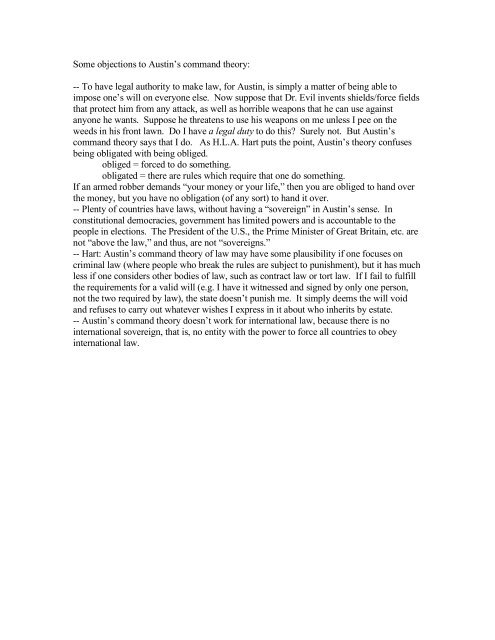LEGAL POSITIVISM vs. NATURAL LAW THEORY - NMSU Web ...
LEGAL POSITIVISM vs. NATURAL LAW THEORY - NMSU Web ...
LEGAL POSITIVISM vs. NATURAL LAW THEORY - NMSU Web ...
You also want an ePaper? Increase the reach of your titles
YUMPU automatically turns print PDFs into web optimized ePapers that Google loves.
Some objections to Austin’s command theory:<br />
-- To have legal authority to make law, for Austin, is simply a matter of being able to<br />
impose one’s will on everyone else. Now suppose that Dr. Evil invents shields/force fields<br />
that protect him from any attack, as well as horrible weapons that he can use against<br />
anyone he wants. Suppose he threatens to use his weapons on me unless I pee on the<br />
weeds in his front lawn. Do I have a legal duty to do this? Surely not. But Austin’s<br />
command theory says that I do. As H.L.A. Hart puts the point, Austin’s theory confuses<br />
being obligated with being obliged.<br />
obliged = forced to do something.<br />
obligated = there are rules which require that one do something.<br />
If an armed robber demands “your money or your life,” then you are obliged to hand over<br />
the money, but you have no obligation (of any sort) to hand it over.<br />
-- Plenty of countries have laws, without having a “sovereign” in Austin’s sense. In<br />
constitutional democracies, government has limited powers and is accountable to the<br />
people in elections. The President of the U.S., the Prime Minister of Great Britain, etc. are<br />
not “above the law,” and thus, are not “sovereigns.”<br />
-- Hart: Austin’s command theory of law may have some plausibility if one focuses on<br />
criminal law (where people who break the rules are subject to punishment), but it has much<br />
less if one considers other bodies of law, such as contract law or tort law. If I fail to fulfill<br />
the requirements for a valid will (e.g. I have it witnessed and signed by only one person,<br />
not the two required by law), the state doesn’t punish me. It simply deems the will void<br />
and refuses to carry out whatever wishes I express in it about who inherits by estate.<br />
-- Austin’s command theory doesn’t work for international law, because there is no<br />
international sovereign, that is, no entity with the power to force all countries to obey<br />
international law.












